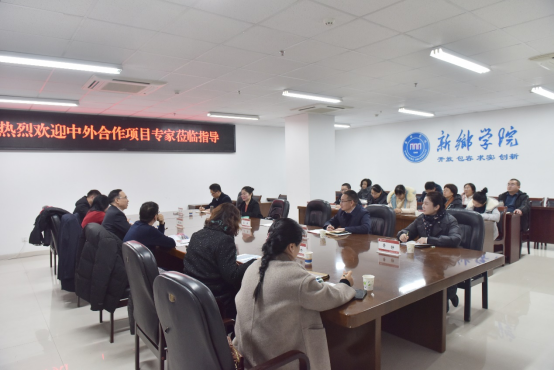On the afternoon of January 2nd, Xinxiang University held a symposium on Sino-foreign cooperative education in Room 1001, South Building of the university library. The event invited distinguished experts, including Professor An Limin, Vice President of the Henan Provincial Law Education Research Association and former Party Secretary of the International College of Zhengzhou University; Professor Shi Maosheng, Executive Director of the Henan Provincial Research Center for Educational Opening-Up and Internationalization and doctoral supervisor at Zhengzhou University; Professor Zhao Yang, Director of the International Office of Henan Normal University; and Professor Chen Yunxiang, former Dean of the International Education College of Henan Normal University. Vice President Song Wei of Xinxiang University attended the symposium, along with leaders from the International Office, the International Education College, and related faculties. The meeting was chaired by Wei Shuangfei.
Song Wei delivered the opening speech, expressing sincere gratitude to the experts for their guidance despite their busy schedules. He emphasized the critical role of Sino-foreign cooperative education in advancing China’s high-quality development of educational openness. In recent years, Xinxiang University has continuously improved the quality of international talent cultivation and aims to strengthen communication with overseas universities and institutions in cultural exchange, teaching collaboration, scientific research, and talent development. He noted that the symposium would leverage the experts’ insights to diagnose challenges, pool wisdom, and propel the university’s cooperative education efforts toward “introduction, digestion, absorption, integration, and innovation,” ultimately elevating the program to new heights.
The experts thanked Song Wei for his welcome and commended the university’s commitment to prioritizing cooperative education on the first working day of 2024. They shared experiences from Zhengzhou University and Henan Normal University, highlighting that Sino-foreign cooperative education not only introduces high-quality international educational resources but also broadens students’ horizons, fosters mutual learning, and serves as a “new engine” and “pioneering field” for higher education reform. They stressed its role in advancing discipline development, institutional innovation, faculty internationalization, and the adoption of global quality assurance systems.
Following a presentation by Li Juan on the current status of Xinxiang University’s cooperative education programs, the experts provided targeted advice. They underscored the importance of strong leadership, careful selection of overseas partners, solid foundational preparation, and meticulous documentation for successful applications. Drawing on their experiences, they shared both successful cases and lessons learned, offering practical solutions to challenges raised by faculty members during a Q&A session.
The symposium served as a dynamic platform for knowledge exchange and strategic collaboration. Through this “brainstorming” session, Xinxiang University gained clearer strategies and pathways to enhance its cooperative education initiatives. Moving forward, the university is poised to leverage these partnerships as a model for driving further innovation and excellence in Sino-foreign educational collaboration.


